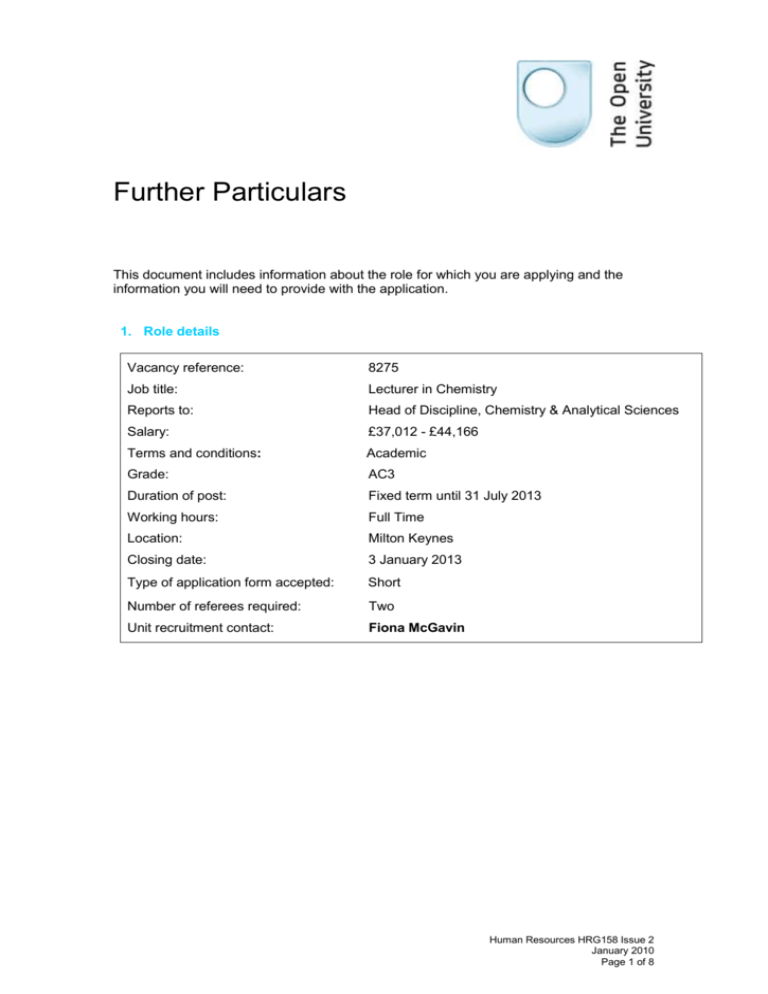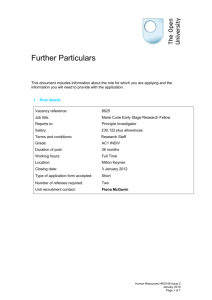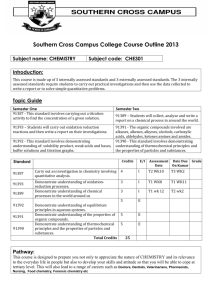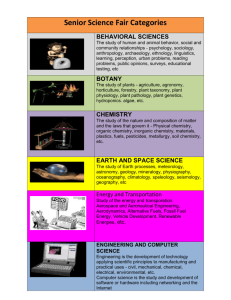Essential - The Open University
advertisement

Further Particulars This document includes information about the role for which you are applying and the information you will need to provide with the application. 1. Role details Vacancy reference: 8275 Job title: Lecturer in Chemistry Reports to: Head of Discipline, Chemistry & Analytical Sciences Salary: £37,012 - £44,166 Terms and conditions: Academic Grade: AC3 Duration of post: Fixed term until 31 July 2013 Working hours: Full Time Location: Milton Keynes Closing date: 3 January 2013 Type of application form accepted: Short Number of referees required: Two Unit recruitment contact: Fiona McGavin Human Resources HRG158 Issue 2 January 2010 Page 1 of 8 2. Summary of duties You will contribute to the design and delivery of OU modules at undergraduate and postgraduate level in the Chemistry and Analytical Science pathway of the Natural Science programme. Candidates should be prepared to bring an imaginative approach to the challenge of presenting science courses and programmes for a wide range of adult students of different backgrounds. For the duration of this post, the role holder will be expected to: Be an active member of the Discipline of Chemistry and Analytical Sciences and of the Department of Life, Health and Chemical Sciences in which the Discipline is embedded. Contribute to the production of the organic chemistry sections, including practical elements, of the 60 point S215 Chemistry a second level general chemistry module. Contribute to discussions on the content and structure of the organic chemistry part of a revised level 3 chemistry module. Take an active role in a team developing and delivering context and problem based learning within the general areas of chemistry and analytical science. Engage with the activities of eSTEeM. You will be encouraged to contribute to projects within this area, exploring the frontiers of STEM education. The general duties for academic staff include, but are not limited to: 1. Teaching a. To contribute to the development, planning, implementation and updating of a high quality and successful curriculum b. To prepare learning materials suitable for the teaching and learning methodologies used by the Open University. c. To contribute to the briefing, debriefing and training of part time teaching staff (Associate Lecturers). d. To contribute to the direction of teaching and assessment / examination by the University, monitoring of samples of marking by Associate Lecturers, and to act as a member of examination boards. e. To contribute to the assurance and enhancement of the quality of teaching, learning and research within the Department and in line with University standards. 2. Research a. To undertake a self-directed programme of research and/or scholarship at a level commensurate with the current standards of excellence in the Faculty. b. To generate grant income as appropriate. c. To undertake research and/or scholarship that is internationally competitive and leads to high-impact publications d. To supervise postgraduate research students e. To participate in Departmental and Faculty seminars and workshops aimed at sharing research outcomes and fostering interdisciplinary collaboration. 3. Outreach a. To contribute to the outreach activities of the Faculty. b. To participate in the national and international science community and learned societies. c. To enhance the reputation of the Department, the Faculty and the University through scientific meetings and other activities. 4. Enterprise Human Resources HRG158 Issue 2 January 2010 Page 2 of 8 a. To apply/bid for, deliver, and manage individual enterprise activities as appropriate (e.g. academic supervision of knowledge transfer programmes, consultancy). b. To further Faculty interests by developing and maintaining a network of contacts and engage with businesses and government bodies as appropriate. 5. Administration & Management a. To engage with appropriate administrative tasks (e.g. workload planning, Career Development & Staff Appraisal) b. To contribute effectively to relevant academic or management fora. c. To undertake a programme of continuous professional development. Other duties Comply with the University’s Health and Safety and Equal Opportunities policies in the performance of their duties; Take reasonable care of the Health and Safety of themselves and that of any other person who may be affected by their acts or omissions at work; Co-operate with the Open University in ensuring as far as is necessary, that Statutory Requirements, Codes of Practice, University Policies and Departmental Health and Safety arrangements are complied with; Have a strong commitment to the principles and practice of equality and diversity; Attend appropriate staff development events and undertake appropriate training where necessary to improve your skills in delivering distance learning. 3. Person specification Qualifications, experience and expertise Essential 1. A higher degree in Chemistry or a closely related field 2. Experience of undergraduate teaching in organic chemistry or a closely related subject. 3. An ability to write fluently in order to contribute to chemistry teaching at all levels within the OU portfolio 4. Good oral communication skills 5. Ability to work flexibly and collaboratively across intra- and inter-faculty boundaries and to develop relationships and networks 6. The ability to use information and communication technology in teaching and supporting students 7. An up-to-date knowledge of developments in the field of chemical education 8. Commitment to furthering the University’s policies relating to diversity and equal opportunities Human Resources HRG158 Issue 2 January 2010 Page 3 of 8 9. The commitment and ability to work as a member of a team. Desirable 1. Specialism in organic chemistry or modelling. 2. Experience of supporting students in a distance learning environment. 3. Experience of supporting learners from a wide range of academic backgrounds and abilities 4. Experience in the development and delivery of context or problem based learning 5. Experience in scholarship activities 6. Interest in multimedia presentation of teaching material, particularly for distance teaching 7. Familiarity with communications tools for synchronous working 4. Role specific requirements e.g. Shift working 5. About the unit/department Faculty of Science The Faculty has a staff of about 300, comprising of around 115 academic staff (central and regional/national) with the balance made up of research staff, curriculum managers, laboratory staff, administrators and clerical staff. There are also varying numbers of research students and visiting academic staff. The Faculty has three departments, each with constituent discipline groups: Department of Environment, Earth and Ecosystems Earth Sciences Ecosystems and Biodiversity Department of Life, Health and Chemical Sciences Brain & Behavioural Sciences Cell & Molecular Biology Chemistry & Analytical Sciences Human Biology Department of Physical Sciences Astronomy Physics Planetary & Space Sciences Curriculum The Faculty has developed an extensive range of modules using the Open University's supported open learning teaching model. These modules contribute to a number of Human Resources HRG158 Issue 2 January 2010 Page 4 of 8 qualifications such as the BSc (Hons) Natural Sciences and the more general BSc (Open) degree. In addition, the Faculty supports a number of diplomas and certificates including interdisciplinary offerings with other faculties. Students can choose to study any of our modules and qualifications at their own pace and are supported by tutors, study advisers and on-line conferences. There are optional face to face tutorials for some modules, but many of our modules are accessible entirely online and it is possible to complete the whole Natural Sciences BSc degree in this way. This level of accessibility means that the Faculty supports a large proportion of all the part-time undergraduate degree studies undertaken in the UK. In addition to our degree level programmes, the Faculty offers an innovative range of Science Short Courses that are designed to provide a taster of Level 1 study for those new to undergraduate study. The Faculty also offers a Master's postgraduate degree programme with several taught degrees including the first UK MSc to be accredited by the Council of Graduate Schools as a Professional Science Master's. The launch of a new suite of modules in Practical Science (S288) in February 2012 sees an exciting opportunity for engaging in practical science through online environments and laboratory and field-based activities. The five modules reflect each of the five major disciplines: chemistry and analysis (SXC288); environmental science (SXE288); earth and environment (SXG288); biology and health (SXL288) and physics and astronomy (SXP288). Two promotional videos outlining these new modules are available to view - S288 Practical Science. Research & Enterprise The Faculty of Science undertakes a range of research across many scientific topics, bringing together traditional scientific disciplines and new interdisciplinary areas through two major research groupings: Centre for Earth, Planetary, Space and Astronomical Research (CEPSAR) Astronomy Environmental Change (Past, Present and Future) Natural Hazards Physics Planetary Geosciences Geochemistry and Cosmochemistry Solar System Exploration Biomedical Research Network Biomolecular Damage Biopsychology Cell Biology Disease and Diagnostics Neuroscience Our research encompasses a wide range from 'blue skies' to applied research finding solutions to specific scientific and technological problems. These research activities are supported by world class laboratory facilities and instrumentation and provide opportunities for full time PhD research studentships supported by our own academics and post doctoral research fellows. There are about 48,000 students studying our undergraduate and postgraduate science Human Resources HRG158 Issue 2 January 2010 Page 5 of 8 modules, mainly based in the UK, but increasing numbers are studying online globally. There are also several hundred PhD research students studying full time in our laboratories at our campus in Milton Keynes or part time at partner institutions or affiliated research centres. We have over 4500 square metres of state-of-the-art research laboratories with major research facilities that include: A recently opened facility for interdisciplinary research in ecosystems and geobiology. One of Europe’s leading centres for isotope mass spectrometry including extensive radiogenic, noble gas and stable isotope mass spectrometry facilities and a new £3 million microbeam facility, including a Cameca Nanosims ion imaging system and dual beam FIB-SEM Ultraclean spacecraft instrument testing and assembly, and for handling planetary materials and returned extraterrestrial samples A state-of-the-art life sciences research facility including biological containment laboratories, molecular genetics and DNA-sequencing laboratories Environmental and transmission electron microscopy Hypervelocity Impact laboratory Well equipped laboratories for research in atomic, molecular and plasma research Employers, Science, Technology, Engineering, Entrepreneurship, Mathematics (eSTEeM) eSTEeM is an initiative to bring together academics within Science and the Faculty of Maths, Computing and Technology to develop new approaches to teaching and learning. This centre builds on existing collaborations developed within the Centres for Excellence in Teaching and Learning (CETLs) based at the OU and with other Faculties, aiming to embed new approaches around priority areas such as e-assessment, online experimentation, etc. Further information on the Faculty can be found on our website at http://www8.open.ac.uk/science/main/. Department of Life, Health & Chemical Sciences Head of Department: Dr Hilary MacQueen The Department is made up of 44 academics who undertake teaching, research and scholarship across a wide range of scientific and pedagogic areas. In addition, there are currently 5 post-doctoral researchers and 19 full-time research students. The Department comprises four constituent discipline groups: Brain & Behavioural Sciences, Cell & Molecular Biology, Chemistry & Analytical Sciences and Human Biology. Our Teaching The Department of Life, Health and Chemical Sciences presents a large number of modules that contribute to the BSc Natural Sciences, the BSc Health Sciences, and various Certificates and Diplomas. We also offer all four of the Faculty of Science’s Foundation degrees, and we are at the forefront of employer engagement within the university. We present all the 15-credit Long-Term Conditions modules, and many of the Science Short Modules (10 credits each). We also contribute to several modules at Masters level, in the MSc qualifications in Science, Science and Society, Professional Science, Medicinal Chemistry, Medical Physics and Psychology. Human Resources HRG158 Issue 2 January 2010 Page 6 of 8 At postgraduate level, the Department runs a full PhD research degree programme with students supported by the BBSRC, MRC, charities (such as Research into Ageing and The Migraine Trust) and The Open University. Members of the Department have made many pedagogic innovations, particularly relating to the on-line delivery of practical science and work-based learning, and its assessment. Our Research Members of the Department conduct research within all three of the Faculty’s major research centres, CEPSAR, BRN and eSTEeM. Our research teams comprise biologists, chemists, physicists and psychologists who contribute to a vibrant and interdisciplinary research community. The available laboratory facilities include molecular genetics laboratories, cell and tissue culture suites with time-lapse imaging capabilities, electron, confocal and atomic force microscopes, histology and morphometric laboratories and a radiation suite which houses a cell harvester, beta scintillation and gamma counters. We have an impressive range of GC/LC-MS and liquid chromatography instruments, a range of spectroscopy instruments, and an Xray diffraction facility. We also have a whole-organism facility. Department members offer a range of specialist skills and expertise across the life, health and chemical sciences. We are keen to involve external partners in our research through their involvement in collaborative research projects, sponsored PhD studentships and contract research projects. Much of our research is based on very successful collaborations with other universities and institutes and with industry, both nationally and internationally. Recent research funding in the Department has come from, amongst others, the BBSRC, EU Framework 6&7, World Cancer Research Fund, Wellcome Trust, Leverhulme Trust, Multiple Sclerosis Society, MRC, the Royal Society, NAAR/Autism Speaks, Research into Ageing and NIMH. Our industrial research partners include Regen, Cyclacel Ltd, Human Factors International, Eusa Pharma (Europe) Ltd, Hill Group Aggregate, Entec UK Ltd, Charles Church, Black & Veatch, TAP, Dow-Corning, BP and Hichrom. Our Outreach Members of the Department of Life, Health and Chemical Sciences were in the vanguard of developing health education in sub-Saharan Africa through the HEAT project: http://www8.open.ac.uk/africa/heat/ The Department has strong links in this part of the world and elsewhere, and we are developing a number of opportunities for collaborative teaching and research projects. Closer to home we have many links with schools and communities across the UK. We have also benefited enormously from our long-standing relationship with the BBC, which enables us to disseminate our teaching and research. 6. How to obtain more information about the role or application process If you would like to discuss the particulars of this role before making an application please contact Dr Elaine Moore on +44(0)1908 655028 or email e.a.moore@open.ac.uk. If you have any questions regarding the application process please contact Fiona McGavin on Human Resources HRG158 Issue 2 January 2010 Page 7 of 8 +44 (0)1908 858110 or email science-recruitment@open.ac.uk. 7. The application process and where to send completed applications Your application should include: Short application form Cover letter detailing how you meet the person specification CV Please ensure that your application reaches the University by: Thursday 3 January 2013 E-mail science-recruitment@open.ac.uk Or post it to: Name/Job title: Fiona McGavin Department/Unit: Faculty of Science Address: The Open University Walton Hall Milton Keynes Post Code: MK7 6AA 8. Selection process and date of interview The interview panel will be chaired by Professor Hazel Rymer, Dean & Director of Studies. The other members of the interview panel will include Dr Elaine Moore, Head of Discipline, Chemistry & Analytical Sciences. The interview date will be advised. Shortlisted candidates will be asked to prepare a piece of teaching text on a specified subject for discussion at interview. We will let you know as soon as possible after the closing date whether you have been shortlisted for interview. Further details on the selection process will also be sent to shortlisted candidates. Applications received after the closing date will not be accepted. Human Resources HRG158 Issue 2 January 2010 Page 8 of 8







